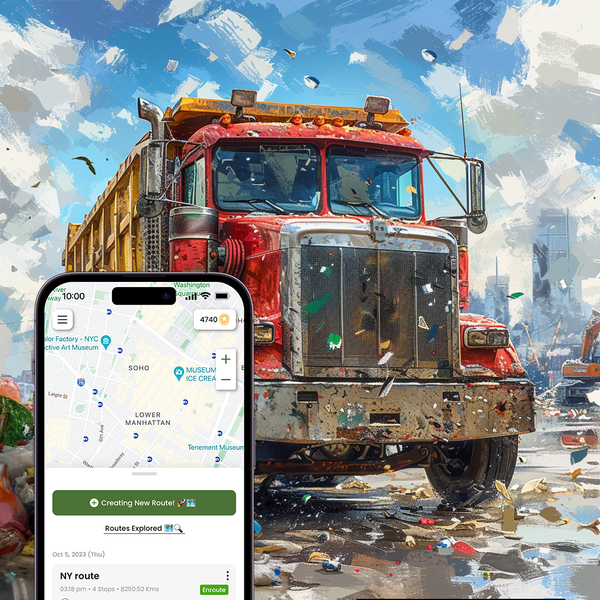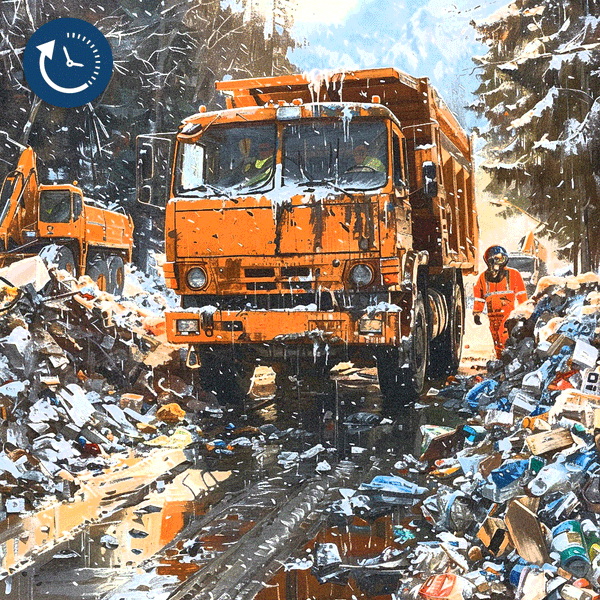The world generates 2.01 billion tonnes of municipal solid waste annually, with at least 33 percent of that—extremely conservatively—not managed in an environmentally safe manner.
In the ever-evolving landscape of waste management, the optimization of collection routes stands out as a pivotal strategy for upholding public health and safety.
The intricate dance of waste collection and disposal necessitates a fresh perspective on route planning, one that not only improves efficiency but also minimizes environmental impact.
This blog delves into the multifaceted importance of route optimization in waste management and introduces a transformative solution, DynoRoute, a sophisticated route planning and optimization software.
The Challenges in Traditional Waste Management Routes
1. Inefficient waste collection system
Traditional waste management routes often fall prey to inefficiencies, leading to overlapping and inconsistent waste collection schedules. The irregular waste collection schedules are not just an operational failure but also impact public health adversely. The missed pickups become potential breeding grounds for sanitation issues.
2. Environmental impact
The environmental toll of traditional routes is a matter of concern. Increased fuel consumption and emissions associated with poorly planned routes contribute significantly to the carbon footprint of waste management operations. The urgency to adopt eco-friendly practices is evident.
3. Safety concerns
Navigating through congested urban spaces and narrow residential areas poses safety challenges for waste collection vehicles. Accidents and injuries become more likely in the absence of a meticulously planned route that prioritizes safety for both workers and the general public.
The Role of Route Optimization in Waste Management
To overcome the challenges faced by traditional route planning and optimization techniques, you must get assisted with the modern approaches. Let’s together understand how route optimization tools benefit waste management companies and unlock their full potential.
1. Improved efficiency
Dynamic route planning, a hallmark of optimization, translates to reduced travel time and enhanced fuel efficiency. The streamlining of collection routes ensures that waste management operations become more cost-effective and responsive to community needs.
2. Environmental sustainability
The shift towards optimized routes is a significant step in minimizing the environmental impact of waste management. By curbing fuel consumption and overall operational emissions, waste collection becomes a contributor to, rather than a detractor from, environmental sustainability.
3. Enhanced safety measures
A strategic approach to route optimization significantly contributes to safety. By meticulously planning paths, taking into account potential hazards, and leveraging technology to avoid high-risk areas, waste management companies can create safer working conditions and reduce the likelihood of accidents.
Revolutionizing Waste Management Logistics Through Route Optimization Features
Compared to manual trash route planning, don’t you think integrating modern route optimization techniques will be fruitful? Here’s how the robust route optimization software features can transform waste management logistics, making the entire process more efficient and cost-effective.
1. Intelligent route planning
At the forefront of innovation, route optimization software distinguishes itself with intelligent and dynamic route planning. Leveraging advanced algorithms, the software constantly analyzes real-time data, adapting routes on the fly to accommodate changing variables like traffic patterns and weather conditions.
2. Customizable solutions
One of its strengths lies in its adaptability. The software offers customizable solutions, allowing waste management companies to tailor routes according to their unique operational requirements. This flexibility ensures seamless integration with existing waste management systems.
3. Data-Driven decision making
DynoRoute's power lies in data analytics. By harnessing the insights derived from data, waste management operators can make informed decisions. Predictive analytics take center stage, enabling proactive planning that minimizes disruptions and keeps waste management operations on track.
Frequently Asked Questions
How does DynoRoute handle real-time changes in route planning?
DynoRoute's real-time adaptability is a result of continuous monitoring. By staying vigilant to changes in traffic, weather, and other variables, the software ensures that waste management routes remain optimized and responsive.
Can DynoRoute integrate with existing waste management systems?
Absolutely. DynoRoute understands the importance of seamless integration. The software is designed with flexibility in mind, allowing for easy customization and integration with existing waste management infrastructure.
How does route optimization contribute to environmental sustainability?
Route optimization is a cornerstone in the drive towards environmental sustainability. By minimizing travel distances and reducing fuel consumption, waste management operations become greener, aligning with broader eco-friendly initiatives.
The Final Words
In the grand tapestry of waste management, optimizing routes emerges not just as a strategy but as a responsibility. DynoRoute, with its forward-thinking approach to route planning and optimization, is poised to redefine how waste management logistics unfold. Embracing such technological solutions is more than an operational upgrade; it's a commitment to building cleaner, safer, and more sustainable communities.
As we navigate the path toward a greener future, route optimization becomes a beacon, guiding waste management practices toward a harmonious coexistence with public health and environmental well-being.








